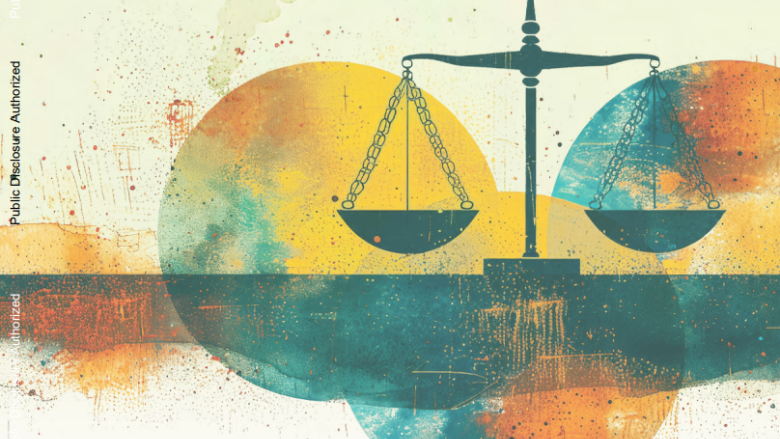Governance & Institutions Umbrella Program (G&I)
Justice and Rule of Law - Activities
1. The Global Program on Justice and Rule of Law
The G&I contributes to the Global Program on Justice and Rule of Law (JROL), which is dedicated to enhancing the effectiveness of justice institutions. When these institutions function efficiently, they lead to increased accountability, foster greater trust in government, and enable citizens and businesses to invest with the assurance that their rights will be safeguarded. JROL plays a pivotal role in promoting judicial effectiveness by producing research outputs such as papers, policy briefs, and practical guides on justice reform, focusing on innovative topics. The program also engages in World Bank operations focused on judicial reform. These efforts concentrate on various areas, including legal framework reform, process reengineering, capacity building, legal empowerment initiatives, workflow efficiency, case management, and strengthening human resources.
Among the activities, G&I has supported the following.
 | The JUPITER framework is a universally applicable country-based framework for measuring the effectiveness of a country’s judiciary. Its goal is to use data to identify strengths and weaknesses around key pillars of judicial effectiveness and to serve as an entry point for operational teams to develop a practical sequence of reform and capacity development actions in WBG operations. The output of the assessment is a study that provides the analytical underpinning for dialogue on justice reform and helps prioritizing efforts according to a country’s needs. |
 | Supporting Access to Justice in South Sudan - A 2025 JUPITER Assessment This report assesses the state and performance of the justice system of South Sudan through the JUPITER methodology. The study focuses on the system’s effectiveness in service delivery across three areas: Access to Justice, Efficiency, and Quality. JUPITER aims to identify strengths and areas of improvement in these key areas, serving as a basis for policy dialogue. |
 | "Reforming Justice" Thematic Briefs A series of thematic briefs titled "Reforming Justice," provide practical insights into the implementation of justice reforms across various topics, including judicial budgeting, court mapping reform, designing small claim courts and procedures, benchmarking the effectiveness of the justice system, and fostering engagement with customary justice actors. |
 | Improving Access to Justice in Liberia – A 2023 JUPITER Assessment In the first JUPITER assessment, a standardized methodology is used to benchmark the state and performance of Liberia’s judiciary against specific measures of effectiveness and to compare key features across countries. The study focuses on the effectiveness of the system in service delivery in three areas – access to justice, efficiency, and quality – and presents the main challenges that emerged from the empirical work to provide data-informed context-specific suggestions for reform. |
2. Zambia: Assessment of Access to Justice and Alternative Dispute Resolution Systems
The project continued the efforts of the Zambia Judicial Sector Public Expenditure and Institutional Review concluded in June 2022, focusing on the demand-side aspects of Access to Justice in a rural Zambian setting. It also evaluated the current state of Alternative Dispute Resolution (ADR) mechanisms in the country. Employing a people-centered approach, the assessment aimed to address three main lines of inquiry: understanding the justice-seeking experiences of citizens for a nuanced view of their behavior in pursuing justice; mapping the landscape of access to justice through ADR, including the infrastructure and interventions in Kawambwa, a rural area; and identifying actionable short- to medium-term solutions to enhance access to justice. The findings were discussed in a validation workshop with the Ministry of Justice, which will use the report’s findings to inform a new Government Strategy Paper.
3. Enhance Knowledge and Analytical Underpinning of Justice Sector Reform in Serbia
This newly launched project aims to enhance knowledge and analytical underpinning of justice sector reform in Serbia in line with the EU accession process. The objective will be achieved through targeted analytical work, advisory work, technical assistance, and capacity building initiatives. Justice reform is a crucial aspect of Serbia’s development agenda and is tightly entwined with the country’s journey to European Union (EU) accession. For several years now, Serbia has been working to ensure that its national legal framework is in line with EU requirements and has made significant efforts to undertake the necessary institutional changes in the justice sector. In January 2022, Serbia adopted amendments to its Constitution, aimed at improving judicial independence and accountability, which gave additional impetus to justice sector reform. Relevant legislation aimed at implementing constitutional changes was adopted in mid-2023 to reduce political influence over judicial appointment and promotion.
The activity is expected to contribute to:
- Strengthening key institutions in Serbia’s justice sector, with a particular focus on HR management.
Raising the performance level of Serbia’s justice system so that it is comparable to EU Member States
Specifically, the activity will (i) support the improvements in the commercial justice through support for the action plan to support improvements in commercial justice; (ii) contribute to the improved capacity of key justice sector institutions (High Judicial and Prosecutorial Councils) to perform their newly acquired responsibilities. This will be done through the review of current HR capacities and recommendations for their improvements needed to meet requirements for newly acquired responsibilities; and support the prioritization and sequencing of pending judicial reforms through the preparation of a road map for the implementation of a selected number of recommendations from the 2021 Serbia Judicial Functional Review.
Explore other G&I-funded activities in:
Public Administration and Institutional Reform
Anticorruption, Transparency and Open Government
GovTech and Public Sector Modernization
Multistakeholder Engagement and Coalitions for Reforms
Go back to G&I Activities page



